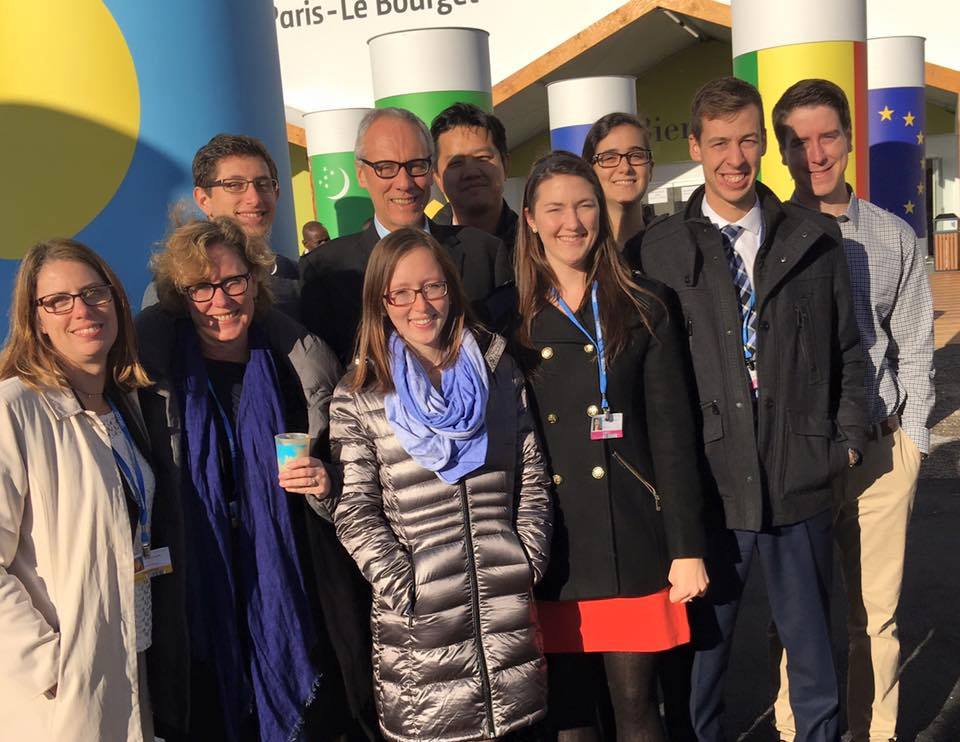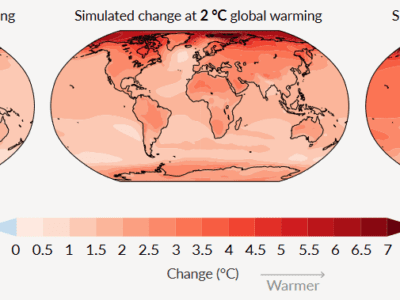Student Guest Blogger Terra Laughton: Perspectives on COP21
Terra Laughton, UCLA School of Law JD class of 2017, shares her perspective on attending the Paris climate negotiations

I am a second-year student at UCLA School of Law. I recently returned from two weeks in Paris attending COP21. My classmates and I had already boarded our plane at Charles De Gaulle when the Paris Agreement was officially adopted—we learned of the news upon landing in Los Angeles. While it would have been exhilarating to share in the excitement and relief of that final moment, I remain convinced we were there for the most fascinating part, the preceding ten days of often painful negotiations.
Early on in the negotiations in Paris, I attended various sessions focused on the preamble to the Agreement. There was one paragraph in particular that consistently stirred up controversy. It is now paragraph eleven of the preamble, and reads as follows:
Acknowledging that climate change is a common concern of humankind, Parties should, when taking action to address climate change, respect, promote and consider their respective obligations on human rights, the right to health, the rights of indigenous peoples, local communities, migrants, children, persons with disabilities and people in vulnerable situations and the right to development, as well as gender equality, empowerment of women and intergenerational equity . . . .
At first, I was puzzled that language in a non-operative portion of the text would inspire such disagreement. It seemed simple enough to approve of the sentiments expressed in the paragraph. And yet, was it really necessary to include specific references to rights and populations? And why those communities in particular? It became clear that, as was true with virtually every part of the agreement, certain parties believed strongly in the inclusion of such language, while others did not.
One evening at a preamble negotiation, I was approached by a member of one of the youth organizations present at the conference. She handed me a half sheet of paper with her group’s preferred text for paragraph eleven, which is largely reflected in the final agreement. She emphasized the importance of including “intergenerational equity” and asked for my support. I explained that while I was wearing a party badge, I was not a negotiator and was unable to take a position for the country I was supporting. She thanked me and moved on.
It was not until the second week of the conference, when negotiations continued largely behind closed doors and I was able to attend some of the side events taking place at the center, that I began to understand the importance of individual words in the preamble. After a week of observing the process in Paris, I had grown somewhat tired of the seemingly endless discussions. I was pleased to have a break from the negotiations. Generally, I felt that the parties were discussing all of the important issues – historical responsibility, national sovereignty, adaptation cooperation, sustainable development – but in a way that felt like they were often talking past one another. I sensed a complete lack of urgency in the negotiating rooms, which was a surprise given the media’s portrayal of the conference. There was no acknowledgment of the increasingly grave nature of climate modeling data, no evidence-based conversations at all, at least in the rooms I was in.
December 10, our penultimate day at the COP, was Human Rights Day. It commemorates the adoption of the Universal Declaration of Human Rights, which occurred, appropriately enough, in Paris in 1948. That day, I attended a panel presented by the UN Commission on Human Rights, followed by a second panel devoted to human mobility and climate change.
John Knox, Special Rapporteur on Human Rights and the Environment, asserted that one important goal of Paris is to recognize the clearly established connection between human rights and climate change. Although the panelists acknowledged that human rights obligations exist regardless of whether there is explicit reference to them in the Paris Agreement, they agreed that including such references sends a clearer signal that these considerations should seed further negotiations. One of the panelists relayed a statistic from the Pacific Climate Change and Migration project: an estimated 72% of the inhabitants of the island nation of Tuvalu will likely emigrate in the next ten years if nothing is done to combat climate change. He characterized this reality as implicating the fundamental right to self-determination.
The migration panel included similar discussions. William Lacy, Director General of the International Organization for Migration, noted that it was not until 2010 that the language “forced migration” was mentioned explicitly in the UNFCCC negotiations. I was reminded by other panelists of the interplay between displacement, refugee challenges, and violent conflict. Various speakers asserted that it was necessary to include language regarding forced mobility in the Paris Agreement.
I came away from these panels persuaded that the side events were where the most robust and interesting conversations at the conference were occurring. I also began to grasp what now seems obvious about the debates surrounding preambular language. References in the Agreement to human rights, migrants and other vulnerable communities are significant not because of any substantive contribution to the text, but because they remind us of why we care, and why we should care far more than we do, about the climate crisis. They root us in the larger reality of the enormous challenge we face. They are one- and two-word placeholders for the voluminous literature on climate impacts and what that science means for real people’s lives.
I would like to think paragraph eleven offers a miniscule, much-needed injection of urgency into the UNFCCC process. Despite my initial skepticism, I came around to the importance of language in the Agreement that identifies the broad social issues implicated by climate change. The precise language of paragraph eleven may seem unavailing and arbitrary. However, like the Paris Agreement overall, it is a signal that parties are aware of the scope of the climate problem and hope to make progress on it.
Reader Comments
3 Replies to “Student Guest Blogger Terra Laughton: Perspectives on COP21”
Comments are closed.






Excellent comment on Paris process and general nature of COPs by a UCLA student. Being part of a government negotiator with pink badge, I was frustrated not being able to explain why we have to include these words, those words, while they had almost no relevance to real world, at least to the world of negotiators. Many negotiators are not able to see whole picture, they obsessed with what their boss give them a small tasks fighting for small words. But, small words are important, especially people that have no voice there and suffer the most, and you explained it very well. Now, with my new role ( SR on right to food), I am part of the side events, and I agree with you that the most interesting part of the COPs are side events, and excellent learning experience for students like you…
States fight ‘irreversible consequences’ of EPA climate rule:
“……..A coalition of 27 states struck an urgent tone Wednesday in a new plea for a federal court to stop enforcement of the Obama administration’s landmark climate change rule for power plants. The states warn that the Environmental Protection Agency’s (EPA) rule is already affecting energy markets, forcing states to prepare for its implementation and causing irreparable harm, even if state compliance plans aren’t due until 2018……..”
http://thehill.com/policy/energy-environment/264123-states-fight-irreversible-consequences-of-epa-climate-rule
Flurry of lawsuits against Obama climate rules:
“……. Numerous groups and businesses filed lawsuits challenging the Obama administration’s climate change rules for power plants before the deadline on Tuesday. Court records show that at least 10 parties filed suit in the Court of Appeals for the District of Columbia Circuit Tuesday to challenge the Environmental Protection Agency’s (EPA) regulations to reduce carbon dioxide emissions from power plants…….”
http://thehill.com/policy/energy-environment/264101-more-groups-sue-epa-over-climate-rules